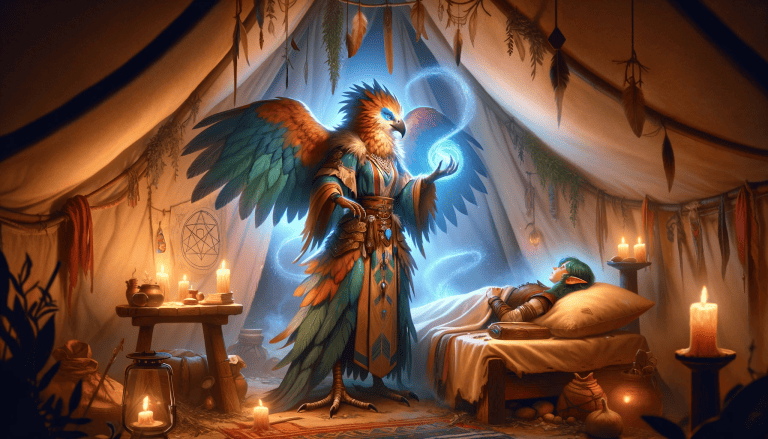Best Rogue Feats in 5e DnD
“No way, scum!” the guard captain barks, “These papers are out of date and none of you look right.” You step forward and carefully modulate your voice to sound like local nobility. When you speak, your companion’s eyes widen almost as much as the guard’s. You’ll have to explain your time with the Actor’s Guild later…
On Feats In 5e DnD
Feats are amazing. They’re a way to fine-tune your character build outside the path defined by class and subclass abilities. And they’re a fun, practical mechanic that adds flavor.
Feats create a sense that we’re building a character shaped by their experiences and not simply picking from a list of pre-determined abilities. Some of their gameplay advantages can be huge too.
Roguish Feats
Typically, Rogues are built around Sneak Attack – often at range. Many of the feats on our list cater to this kind of build, but we’ve also included options for more versatility like a melee focus for the Swashbuckler, magical feats for Arcane Tricksters, poisons for Assassins, etc.
We also thought of smaller adventuring parties when recommending some feats. In a small party, a Rogue might need to fulfill multiple roles. Feats can help build a more versatile character in a situation like this.
A list of every published feat would be exhausting and (arguably) unnecessary for an article about Rogues. Instead, we’ve included ones that players recommend again and again for this class. Enjoy!
How to Use This Guide
Everything in this guide has an emoji, ranking how useful a given ability or feature is to playing this class effectively.
✅ — An absolutely crucial feature. Often forms the backbone of a class’ look and feel. Will provide some bonus that can’t be found through other means.
🆗 — A solid feature that does its job well. Not game-breaking, and certainly replaceable, but a strong choice that shores up some weakness.
⚠️ — A debatable choice. Could work for a specific build, but otherwise is either a wasted opportunity or is just weaker than other alternatives.
⛔ — Outright bad and detrimental. This weighs down the class and just takes up space on the character sheet. A weakness you will have to accommodate for.
These rankings are meant to help you create an optimized class build, but remember DnD isn’t a game where you need to win to have fun. Weaker but flavorful builds have their place and make for fulfilling characters.
✅ Alert
There are a few components to this feat – all of them great for your Rogue. As the name suggests, Alert increases your focus by making your character impossible to surprise when conscious, negates enemies’ advantage when hidden, and gives you a +5 bonus to your Initiative (stacks with your Swashbuckler’s Initiative bonus from Rakish Audacity). All of this makes sense for a Rogue from both a roleplaying and mechanical point of view.
✅ Actor
The name alone suggests a certain synergy with the Rogue class. Impersonation has been part of the Rogue’s arsenal in many classic books, games, and movies. This feat increases your Charisma score to a maximum of 20, allows you to mimic the speech and sounds of others, and gives advantage on Charisma (Deception) and Charisma (Performance) checks when impersonating others.
Taking this feat can boost your infiltration abilities significantly. You become hard to pick out from regular citizens in the city or from troops in the garrison. To spot your deception, a creature must roll a successful Wisdom (Insight) check contested by your Charisma (Deception). Boatloads of fun for a keen roleplayer/aspiring actor.

🆗 Bountiful Luck (Halfling Only)
Halflings are lucky. So lucky it even rubs off on their companions from time to time.
- When an ally visible to you within 30 feet rolls a 1 on the d20 for an attack, ability check, or saving throw, you can use your reaction to let them reroll the die. They must use the new roll.
- After using this ability, your racial Lucky trait is unavailable until the end of your next turn.
Halfling bonuses to Dexterity makes for excellent Rogue builds. This feat can help you confer some of that race’s extraordinary luck onto the rest of your party. If you’re the type of player who loves to play support and help out the team, this one is worth a look.
🆗 Crossbow Expert
Though not important for every Rogue, some love the crossbow in the off-hand style. By regularly practicing with your crossbow, you gain the following benefits:
- You ignore the loading component of crossbows you’re proficient in.
- You no longer suffer disadvantage on the shot if an enemy is within 5 feet.
- When you attack with a one-handed weapon, you can use your bonus action to fire a hand crossbow with the other hand.
Your Rogue’s existing class features negate many of these benefits. However, if you’re building a sharpshooter-type character, having a second chance to land that Sneak Attack can make a difference. When using a hand crossbow, Crossbow Expert allows you to trade a bonus action for an extra attack – useful for sharpshooters.
🆗 Defensive Duelist
This is useful for any melee-focused Rogue and a particularly good fit for the Swashbuckler. Defensive Duelist makes you harder to hit when wielding a finesse weapon you’re proficient in. If hit by an enemy melee attack, you can use your reaction to add your proficiency bonus to your AC. This can potentially cause the attack to miss. Swashbucklers take note. Many bucklers are swashed with this feat.

⚠️ Drow High Magic (Drow only)
Apart from the inconvenience of sunlight sensitivity, the Drow race makes for good Rogues. And an understanding of their magical ways can help their overall usefulness even further. On taking this feat, you learn Detect Magic which you can cast at will without expending a spell slot.
You also learn the spells Levitate and Dispel Magic. These can be cast once per long rest without using a spell slot. If your Rogue is often the target of magical traps while scouting ahead, there’s some real value here. And Levitate is just plain useful.
🆗 Dual Wielder
Taking this feat means you’ve mastered the art of two-weapon fighting and gain the following benefits:
- You gain +1 to AC while wielding a separate weapon in each hand.
- You can use non-light, one-handed weapons in each hand (not possible without this feat).
- You can draw and sheath two weapons as quickly as a single weapon.
This is a tricky one to recommend from a purely mechanical point of view. We do, however, concede that dual-wielding Swashbucklers are dope. Raising your Dexterity gets you the same AC and damage boost this feat offers. Having two weapons for a Rogue is chiefly about landing an extra Sneak Attack and not increasing base damage. It can work. But it’s not the holy grail for Rogues.
✅ Dungeon Delver
There’s an expectation that as a Rogue, you’ll handle locked doors, nasty traps, and generally suspicious-looking stuff. This feat boosts your skill in all of these activities. You gain the following benefits:
- Advantage on Wisdom (Perception) and Intelligence checks to detect secret doors.
- Advantage on saving throws to avoid or resist traps.
- Increased resistance to damage from traps.
- You can now search for traps while moving at full speed.
This is all pretty good for the party’s chief Scout. One to consider for many Rogues.
🆗 Eldritch Adept (Spellcasters or users of Pact Magic only)
This one only applies to the Arcane Trickster. After extensive occult research, you’ve unlocked some dormant eldritch power within you. It allows you to choose one Eldritch Invocation from the Warlock’s list. If the invocation has a prerequisite, you must meet it (essentially meaning you must be a Warlock to use that invocation). You can change invocation each time you gain a level.
Devil’s Sight is a particular favorite for Rogues, especially those without darkvision from their racial pick. Other picks could work. Arcane Tricksters should at least give this feat and the possible invocations a look.
🥷 For more on the Arcane Trickster, check out our in-depth article.

✅ Elven Accuracy (Elf or Half-Elf only)
Elves make for exceptional archers and spellcasters. There’s something special about their ability to place shots with precision under pressure. Elven Accuracy gives you the following benefits:
- You gain 1 point in either Dexterity, Intelligence, Wisdom, or Charisma to a maximum of 20.
- Whenever you have advantage on an attack roll using Dexterity, Intelligence, or Wisdom, you can reroll one of the dice once.
This is a solid pick for an elven Rogue. I suggest you put that bonus ability point in Dexterity. Dex is a big deal, and the ability to reroll attacks with advantage comes in handy.
🆗 Fey Touched
You’ve been exposed to Feywild magic, changing you forever with its touch. This one makes a lot of sense for Arcane Tricksters, gaining you the following benefits:
- Increase Intelligence, Wisdom, or Charisma by 1 point to a maximum of 20.
- You learn Misty Step and one other Divination or Enchantment spell of your choice.
The ability score increase is always good and Misty Step is particularly valuable to an Arcane Trickster Rogue. This 2nd level Conjuration spell surrounds you in a silvery mist then transports you to a space up to 30 feet away – perfect for gaining another chance at a Sneak Attack.
✅ Fighting Initiate
You put in the hours to master the fundamentals of a new fighting style and gain proficiency in a weapon from the Fighter’s list. Learning this new skill from a fighter in your party can make for a fun, downtime roleplaying activity. You can pick a new fighting style every time you gain an ability score increase through leveling-up.
As a Rogue, the most obvious reason to grab this feat is to take the fighting style of archery. If you don’t have access to them from your racial pick, this is a great way to unlock bows. A longbow helps you get maximum damage from your ranged Sneak Attacks as a Rogue.
⚠️ Gunner
There is something cool about a musket-wielding Rogue. With steady hands and sharp eyes, you’re quick and accurate with your gun. You gain these benefits:
- Increase your Dexterity by 1 to a maximum of 20.
- Proficiency with firearms.
- Ignore the loading component of firearms.
- You no longer suffer disadvantage on ranged attacks when a creature is within 5 feet.
Ultimately, using a bow probably makes more sense than a gun. Firearms are too loud for a class that depends on being hidden to land their Sneak Attack ability. Still, it could be a fun build.

🆗 Healer
Your adventuring experience taught you the value of dressing wounds and stabilizing injuries. You gain the following benefits:
- When you use a healer’s kit to stabilize a creature near death, they also regain 1 hit point. The Thieves’ Fast Hands ability allows can do this as a bonus action.
- As an action, you can restore 1d6 + 4 hit points to a creature by expending one use of your healer’s kit. The creature also regains hit points equal to their maximum number of hit dice. Fast Hands also works here.
This is a bit of a party-specific one. Healing potions and the Healing Word spell will achieve the same thing. Most Rogues will skip this feat. But having a Thief who can help downed and injured allies might be useful in a small party with limited healing options.
⚠️Infernal Constitution (Tiefling Specific)
Tieflings make for excellent Arcane Tricksters. Those that take this feat have a strong affinity for the infernal, gaining fiend-like qualities.
- Increase your Constitution by 1 to a maximum of 20.
- You have resistance to cold and fire damage.
- You gain advantage on saving throws against being poisoned.
There’s some decent stuff here for a Rogue, since you’re a target for traps and poisons. Worth checking out if you’re a tiefling.
✅ Inspiring Leader (min. Charisma 13 required)
So great is your confidence and charisma, you can bolster the fighting spirit of up to six friendly creatures (including yourself). The creatures must be able to hear, see, and understand you for this ability to work. Each creature gains temporary hit points equal to your level + Charisma modifier. This only works on a creature once per long or short rest.
This can be great for parties with limited healing power. Especially if your Rogue is a Swashbuckler with a decent Charisma score. Fun for roleplay, mechanically very useful, and something you’ll want to do before every challenging encounter.
✅ Magic Initiate
Magic Initiate is a great way to grab some minor magical ability without multiclassing. You choose a Cleric, Bard, Druid, Sorcerer, Warlock, or Wizard and, learn two cantrips of your choice from that class’ spell list. You also gain one first-level spell from the same list. This is a once-per-day ability, always cast at its lowest level. You must complete a long rest before using it again.
The modifier for these new abilities depends on the class you choose – Charisma for the Bard, Sorcerer, and Warlock, Wisdom for the Cleric and Druid, and Intelligence for the Wizard. We could spend the rest of the article talking about the spells and cantrips your Rogue can choose. Some of the most popular include Booming Blade, Green Flame Blade, Find Familiar, and Mage Hand.
✅ Mobile
Mobility can only be a good thing for a Rogue. All of the following abilities are of benefit:
- Your movement speed increases by 10 feet.
- When you use Dash, you ignore the extra movement cost of difficult terrain.
- After making a melee attack (successful or unsuccessful), you don’t provoke opportunity attacks from the attack’s target for the rest of the round.
Getting out of danger and sight is exactly what Rogues love to do. This can be a great choice.
✅ Piercer
Through either greater strength or improved accuracy, you deal damage more effectively with piercing weapons.
- Increase Strength or Dexterity score to a maximum of 20.
- Once per turn, when dealing piercing damage, you can reroll one of the damage dice. You must use the new roll.
- When you score a critical hit on an attack that deals piercing damage, you can roll one extra die piercing damage.
The reroll is a big deal to most Rogues that depend on bow or crossbow attacks. The critical hit effect is less of a big deal, but the extra damage is always nice.

🆗 Poisoner
This feat makes you a master poisoner, giving you the following benefits:
- Your damage rolls now ignore all resistance to poison damage.
- You can coat/dip a weapon in poison as a bonus action instead of action..
- You gain proficiency with the poisoner’s kit (if you don’t already have it). By expending 50gp worth of materials and using a poisoner’s kit for one hour, you create a number of poison doses equal to your proficiency bonus. The poison’s potency lasts for one minute or until you hit your target. A creature hit by a weapon/bolt/arrow coated by this poison must pass a DC14 Constitution saving throw. Failure to pass this check results in 2d8 poison damage, and the target remains poisoned until the end of your turn.
Poisoner can be a fun feat and is thematically a great fit for Assassins.
⚠️ Resilient
This feat allows you to choose an ability score and increase it to a maximum of 20. It also gives you saving throws in your chosen ability. The best use for this is taking Constitution for added toughness. Might be useful for frontline-focused Rogues.
🆗 Ritual Caster (minimum 13 Intelligence/Wisdom required)
Choose a class: Bard, Cleric, Druid, Sorcerer, Wizard, or Warlock. You extensively practice certain 1st level spells from that class and can now cast them as rituals. You keep these spells t in a ritual book that you hold in your hand as you perform the ritual. Your class determines the spellcasting ability modifier – Charisma for the Bard, Sorcerer, and Warlock, Wisdom for the Cleric and Druid, and Intelligence for the Wizard. The spells you choose must have the ritual tag.
You can learn some written spells by copying them into your ritual book. The spell must be on the list of your chosen class, can’t be higher than half your level rounded up, and have the ritual tag. Copying the spell into your ritual book takes 2 hours and costs 50gp per level. The gold represents the material, parchment, and ink required for you to master the spell through trial and error.
This is a decent choice for Inquisitive Rogues who want some magical ability or Arcane Tricksters looking to increase their magical output. These classes often meet the requirements of this feat at relatively low levels too.
✅ Sentinel
Those who take the Sentinel feat can exploit every momentary lapse in an enemy’s concentration, every drop of their guard. There are lots here for melee Rogues. You gain the following benefits:
- When you hit a creature with an opportunity attack, their speed drops to 0 for the rest of the turn.
- Even when a creature takes the Disengage action, they provoke an opportunity attack when moving beyond your reach.
- When a creature within 5 feet attacks someone other than you, you can use your reaction to make a melee attack.
This one benefits melee Rogues more than ranged ones. The Swashbuckler can benefit from taking this feat since they typically dart around the battlefield, often meeting the positioning requirements.
✅ Sharpshooter
This is a classic choice for ranged Rogue builds for a reason. You have fine-tuned your abilities with ranged weapons until you can do things others find incredible. You gain these benefits:
- You no longer suffer disadvantage when making long-range shots.
- Your ranged attacks ignore half cover and three-quarter cover.
- Before making a ranged attack, you can choose to take a -5 on the attack roll in exchange for a +10 damage if the shot hits.
All of this is great, especially when combined with Sneak Attack. Landing that big +10 damage attack from hiding can lead to some heavy damage numbers.
🆗 Skill Expert
Rogues are pretty skillful as a rule. But if there’s a specific skill you want to improve, this is a way to do it. You’ve put in the time to gain proficiency in particular skills and gain the following benefits:
- Increase one ability score by 1 point to a maximum of 20.
- Gain proficiency in one skill of your choice.
- One of your current proficient skills becomes an area of expertise. Your proficiency bonus is doubled for any check you make with this skill.You must choose a skill that doesn’t already benefit from Expertise.
That we can’t combine this feat with skills affected by our Rogue’s Expertise is arguably a drawback. But the ability score boost and increased utility are nice. Taking this can make you decent at a lot of skills, even when your ability score in their related area isn’t particularly high. Again, probably something useful in smaller parties, where one adventurer needs to fulfill many roles.
✅ Skulker
You are an expert at moving silently through shadows, gaining the following benefits:
- When you miss a ranged attack from hiding, the attempt doesn’t reveal your position.
- You can now try to hide when only lightly obscured.
- Dim lighting conditions no longer impose disadvantage on Wisdom (Perception) checks that rely on sight.
This is savage for a ranged Rogue. This could be a great choice if you want to snipe from a distance and potentially get a second attempt at Sneak Attack.
⚠️ Telekinetic
You learn to move objects using only your mind.
- You can increase your Intelligence, Wisdom, or Charisma by 1, to a maximum of 20.
- You can cast the cantrip Mage Hand. Your spectral hand can turn invisible, doesn’t require any verbal or somatic components, and has a range of 30ft. You can’t attack with it, but it can interact with non-magical items.
- If you already know Mage Hand, its range increases by 30ft.
- Use the ability score you increased when you took this feat as its spellcasting modifier.
- As a bonus action, you can attempt to telekinetically shove a visible creature within 30ft. The target must succeed on a Strength saving throw (DC8 + your proficiency bonus + the ability modifier for the score you increased when taking this feat). If it fails, you shove the creature 5ft toward or away from you.
For a Rogue, one advantage here is the telekinetic shove. It’s a decent way to get out of grapples, but will compete with Cunning Action for your bonus ability. The boost to Mage Hand makes this ability useful for Arcane Tricksters, meaning they can create their already powerful Mage Hand Legerdemain without even needing to speak.
⚠️ Telepathic
Those who take this feat develop an ability to link with the minds of others.
- Increase your Intelligence, Wisdom, or Charisma by 1, to a max of 20.
- You can now speak telepathically with any visible creature within 60ft. You must share a language for them to understand you. This is not two-way communication. They can only hear, not respond.
- You learn the spell Detect Thoughts and can cast it once per long rest without using a spell slot or components. Use the score you increased when you took this feat as its modifier.
🆗 War Caster (min. 1 Spellcasting Ability)
You’ve enough experience under fire to stay cool casting spells in combat. You gain these benefits:
- Advantage on Constitution saving throws to maintain concentration on your spells when you take damage.
- Even when holding weapons/a shield in both hands, you can still perform the somatic component of spells.
- You can now use your reaction to cast a spell at a creature who provokes an opportunity attack. The casting time is one action, and you can only target the creature that’s caused the opportunity.
Some Arcane Trickster will take this to use Green Flame Blade or Booming Blade as a reaction.
⚠️ Wood Elf Magic (Wood Elf only)
Not for most Rogues. This feat can help if your party has frequent problems with stealth. It’s also useful if there’s a specific Druid cantrip you want. You gain these benefits:
- You learn one cantrip from the Druid’s list.
- You learn the spell Longstrider. This increases the speed of a creature you touch by 10 for one hour.
- You learn Pass Without Trace, a spell that conceals you and the party in a veil of shadow and silence. You all gain +10 to Dexterity (Strength).
Far-Reaching Feats
In the spirit of the game mechanic, don’t be afraid to pick things for your Rogue that we failed to mention. There are two ways of looking at feats – as a way of honing your base abilities to a finer edge or a way to add flavor and versatility to your build.
There are no right or wrong choices. Adventurers in smaller parties may use feats to ensure their party is covered in every situation, while min-max-style players may choose feats to give their ultra-specific build a statistical edge. But if something is too good to miss or so weird that it stands out, please let us know! Strange and wonderful character builds? We love to hear about them…







